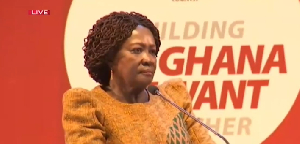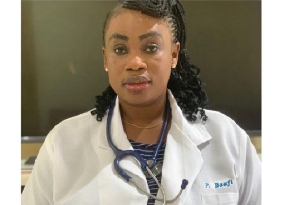Opinions of Tuesday, 26 February 2002
Columnist: Press
ROOTS! A Spiraling Trail Back to Africa
By SUSAN SAULNY for NY Times
That she could trace her family history back to the 1700's in Jamaica using birth certificates and land deeds is remarkable in itself, given the poor records from the days of slavery that usually stall genealogists somewhere in the antebellum South.
But Pearl Duncan, a 52-year-old writer who lives in SoHo, wanted to know more. She wondered how her family, mostly described as "free Negroes" in the old documents, got to the Caribbean. She even wanted to know what is widely considered the unknowable: from which part of Africa they came.
Ms. Duncan, like many people with an interest in genealogy, did years of painstaking historical research; in her case, crisscrossing the country and tracking records on various Caribbean islands. But one thing sets her apart: she was among the first to use new gene technology to help lead her home, to a tribe in the hills of what is now Ghana, in Western Africa.
"I felt like a person stuck in limbo for so long," Ms. Duncan said, her musical voice trailing off, then rebounding. "But now there is no doubt in my mind. When I got confirmation, I was elated, overwhelmed, grateful, even a little cocky because I finally knew. I think all along a lot of people were like, `Let's humor this lady from New York. This is such a long shot.' " G. Paul Burnett/The New York Times Pearl Duncan mixed years of genealogical study with a study of Ghanaians' Y chromosomes to help trace her origins.
Nicknames for Elisha and Annie Duncan, shown in their home in Florida, helped trace their family back to Ghana.
Ms. Duncan's journey took a extraordinary commitment of time and resources. But similar searches will not always be that difficult, scientists say.
At the moment, matching information encoded in a person's DNA to a specific African population is an extremely daunting task, largely because the African databases necessary for genetic comparisons are minimal if they exist at all.
But scientists at various universities and private research organizations are adding to those databanks every day. Some, like Boston University and the University of South Carolina, are developing programs specifically designed to help black people search for their pre-slavery roots. Those databases are expected to be available to the public in the next few years. Similar research is helping scientists trace the Diaspora of Jewish populations.
Ms. Duncan heard news reports about the studies a few years ago, but she ran into one big problem: the kinds of laboratories that had already mastered an understanding of how the Y chromosome passes genetic information from father to son did not offer their services to the public.
But on the strength of the anthropological work she had already done, Ms. Duncan talked one of the country's leading geneticists, Dr. Michael Hammer at the University of Arizona, into helping her without charge. Another factor was that Ms. Duncan was willing to collect most of the DNA herself.
"When she contacted us initially, there weren't any kinds of services available for this kind of DNA typing," said Elizabeth Wood, a doctoral candidate at the University of Arizona who performed the tests with Dr. Hammer. At their lab, most of the research was focused on tracking large migrations through history, not specific families.
Ms. Duncan, however, was persistent. Eventually, the lab sent her cheek swabbers and vials to hold DNA, and she set out to perform hundreds hundreds of interviews and collect samples.
"Certainly she's a pioneer in the sum total of what she's doing," Dr. Hammer said. "I think this is a potential for African-Americans, but the potential is not realized yet. What we did with Pearl is preliminary. It's something that we know now can be done."
Dr. Hammer stressed the importance of not just working with DNA evidence alone. "DNA is just another piece of circumstantial evidence," he said. "You need other information to confirm or test against DNA."
He added that Ms. Duncan was "someone who's taken a complete approach."
Ms. Duncan already had a good sense that both her parents, Elisha and Annie Duncan, had roots in Ghana. That little bit of knowledge took years to solidify, but, she later learned, the clues had been around all her life. They were simply words, like the nicknames her parents called each other — her father was called Pari, and her mother was Daakye. And there were a host of other "funny words" that Ms. Duncan, laughing now, remembers asking her parents not to use when her friends were over when she was a child.
With the help of an African cultural specialist at the Smithsonian Institute in Washington, Ms. Duncan was able to trace the words to the language of the Akuapim people, the fifth largest ethnic population in Ghana. One of the words, her father's nickname, came from the common Akuapim surname Opare.
"I heard from Pearl at least every week for a year," said Peter Pipim, an interpreter of African cultures at the National Museum of African Art. "I think her findings are on the right track because she's done all the cross-cultural checks. Names, even nicknames, are a very good way of keeping track of where families came from. The people who came from this region never stopped calling themselves by the names they knew."
In addition, Ms. Duncan found records of a man who shared her father's nickname in a British slave trader's journal from the 1660's. It was a common name, but the man was headed to colonial British Jamaica, precisely where Ms. Duncan already knew her family once lived in a community of former slaves who had rebelled.
So even before she began thinking about Y chromosomes, Ms. Duncan had a gold mine of information. She used it to focus her DNA sampling.
"At first I was saving money to go to Ghana," she said. "But on second thought, I realized there are enough Africans right here in New York."
Ms. Duncan went to Ghanaian churches and neighborhoods in New York, asking to swab the cheeks of people related to the Akuapim tribe, and sent the raw material — 43 vials of cells — to Ms. Wood and Dr. Hammer in Arizona.
Back at the lab, the researchers began to look for marks or mutations common across the Ghanaian DNA's nucleotide sequences. The researchers found an unusual but harmless mutation that occurred with high frequency, between 90 and 100 percent among the Ghanaians, Ms. Wood said.
"Her father's Y chromosome did indeed have that mutation, making the results consistent with her hypothesis that her father's Y chromosome traces to Ghana," Ms. Wood said.
The laboratory could not give the findings with 100 percent certainty because the mutation in question could be less common in other parts of Africa. Also, the Y chromosome analysis used in Ms. Duncan's case might not work so well for all blacks, particularly those who have ancestry from parts of the world other than Africa. Researchers say about 25 to 30 percent of African Americans will find European ancestry. In these cases, scientists could try to isolate a different part of the genome to study or sample DNA of a different family member.
Ms. Duncan has confidence in her claim of Ghanaian heritage because two independent fields of research — linguistics and genetics — "both tell me the same thing," she said.
Ms. Duncan is working on a historical novel based on her findings. In fact, it was her desire to write the novel, which she started thinking about when she was studying sociology and English in her undergraduate days at Bryn Mawr, that spurred her interest in researching the Duncan family history.
"There are so many black people in the classics," she said. "But many of them don't even have names or developed characters. I was halfway into my own novel when I said, `Wait a minute! You're writing a historical novel and you don't know these people's world views.' I thought if I went back and researched my own ancestors, I would have a better sense of what colonial life was like for African-Americans."
Later, when she began concerted genealogical research in 1995, "that's when a whole new world opened up for me," Ms. Duncan said.
Now, armed with all her new data, Ms. Duncan is close to finishing her book. But the fruits of her genealogical research have given her more than an improved story line, she said. The information has given her a priceless sense of identity and a way of seeing beyond slavery.
"Once you access the African people, you can embrace the culture, not the suffering," she said. "It becomes clearer that slavery was something our ancestors suffered through, but it does not define who they are."












